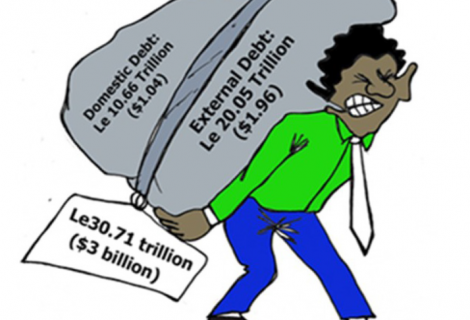
SIERRA LEONE DEBT SITUATION 2020
A Call for Debt Relief, Cancellation, Transparency and Accountability
In a bid to help Sierra Leone tackle its external debt problem, as a means of helping the country address its development challenges, a diverse group of organizations (Budget Advocacy Network, Christian Aid, Action Aid and Oxfam) that work in Sierra Leone have come together, as concerned organizations to offer support to the people of Sierra Leone and its government in their bid for expeditious and full debt cancellation. To achieve this objective, the four organizations came together to act in a coordinated fashion that will advocate and campaign for speedy and full debt relief and cancellation for Sierra Leone and lobby international financial institutions (IFIs), multilateral creditors, bi-lateral creditors, private creditors, and external creditor governments to cancel Sierra Leone’s debts.
The coalition sought an in-depth situational analysis of the looming debt crisis with a focus on the latest debt situation. This report analyzes and builds understanding of the drivers of rising debt burdens, the implications for tax and spending in Sierra Leone, and the potential for actions – both in strengthening transparency of overall debt burdens and managing negative impacts. The analysis will inform CSOs, development and donor partners, private institutions, and other partners on the need for debt cancellation for Sierra Leone, with a focus on improving society in line with climate change and debt justice.
RECOMMENDATION
Request for Debt Relief: The Government of Sierra Leone should join other Low Income Debtor Countries to push for another round of debt relief, stock cancellation, that would free up fiscal space to accelerate spending in the social sectors that would facilitate the attainment of the SGDs. Easing debt service burden would strengthen fiscal policy to promote socio-economic development and prioritise spending on infrastructure to close the huge infrastructure deficit in Sierra Leone without compromising a sustainable debt path.
Pursue sound Debt Management Policies: While seeking for debt relief, the Government of Sierra Leone should strongly pursue the debt policy articulated by the Hon, Minister of Finance in the Government Budget and Statement of Economic and Financial Policies for the Year 2021 that government will (i) continue to seek financing for grant and highly concessional loan; (ii) limit domestic borrowing within sustainable fiscal anchor; (iii) continue to explore non-debt creating financing models such as PPP; and (iv) pay outstanding stock of verified domestic suppliers and contractors arrears subject to availability of budgetary resources.
Debt Relief Campaign by CSO and NGOs: Non-Governmental Organisations (NGOs) and Civil Society Organisations (CSOs) should join global campaign and articulate the need for Low Income Countries including Sierra Leone to benefit from debt relief from creditors in addition to the DSSI and CCRT to free up fiscal space and accelerate spending that will lead to the attainment of the SDGs.
Debt Transparency and Accountability: The Government of Sierra Leone should continue to strengthen public debt management and 15
deepen transparency and accountability surrounding public debt management in Sierra Leone. The regular publication of debt statistical bulletin should be upheld while publishing details of loan contracted including guarantees issued.
Publication of MTDS and conduct of DSA: Government should continually develop and publish Medium Term Debt Strategy (MTDS) and uphold the annul conduct of Debt Sustainability Analysis to assess the exposure to risk of debt distress in the medium to long-term while taking appropriate policy actions to maintain sustainable public debt in the medium to long-term.
Sound Fiscal Policy Management: Government should promote sound fiscal policy management anchored on efficient tax and expenditure systems that would minimize inefficient and unproductive public spending. There should also be in place improved governance that would strengthen public institutions with oversight functions to monitor the quality of public financial management and service delivery.
Prioritises to push at the national, continental, and global levels for reforming of the global debt architecture in a manner that equalises the loan contraction processes – including reform of debt sustainability frameworks and credit ratings assessment. The establishment of an African Accountability Mechanism which acts as the foundation for enhanced transparency, accountability, and governance of Africa’s debt architecture .
We urge the Governments to work with Parliament to strengthen national legal frameworks to ensure transparency and accountability for sovereign debts negotiations, borrowing and management as espoused in the African Borrowing Charter.
Increase the fiscal space for government to enable them to tackle climate change and SDGs.